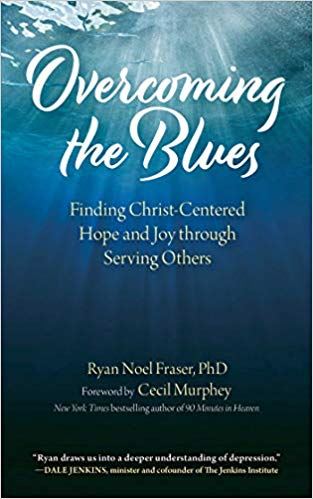5 Ways Helping Others Can Help You Overcome Depression

“Why have I been feeling so depressed lately? What’s wrong with me? Will I ever feel like my old self again?”
If you’ve recently been asking yourself these types of questions, please take heart! I want to encourage you by offering some practical suggestions and much-needed hope for your journey with depression, and to start, it’s important for you to know that you’re not alone.
The dark blue landscape in our nation looms ominously with 18 million adults (one in ten) impacted by depression in a given year. Women are twice as likely to suffer as men. Diagnoses of depression are growing fastest among millennials (ages 18-34), with stats having increased 47 percent since 2013. Among adolescents (ages 12-17), the depression rate has skyrocketed 63 percent over the past six years, with nearly one-in-five teens afflicted. Parents often feel at a loss and woefully ill-equipped to intervene and help their children recover.
Christians are not exempt or somehow immune to the disease or disorder of depression.
In fact, it’s an epidemic in the church as a whole. Just ask your minister or pastor and they’ll tell you what churches are up against when it comes to serious mental health challenges. The devil, as an insidious enemy and predatory roaring lion (1 Peter 5:8), is having a veritable field day with the hearts and minds—and basic sense of emotional wellbeing—of many believers.
When depression assaults believers, it can be extremely disorienting and demoralizing to their spiritual walk. The oppressive, internalized stigma they carry can feel almost unbearable at times, as they struggle with profound shame and irrational guilt for their “unacceptable” emotional state.
Many who suffer either with episodic or more chronic clinical depression mistakenly feel that their faith is flawed, which only compounds the issue and adds insult to injury. “If only I trusted fully in God’s power and was a more dedicated and faithful Christian, I surely wouldn’t be so depressed,” they tell themselves.
All the while, they continue to suffer with depression in silence and embarrassment.
They’re often their own worst critics and struggle with a vicious cycle of self-loathing and unrealistic self-imposed expectations, unwilling to extend any grace to themselves.
If you find yourself battling with depression, you don’t have to look very far in Scripture to discover stories of faithful men and women who, at times, struggled with their mental health. I’m reminded of biblical characters like Abraham, Sarah, Moses, David, Elijah, Hannah, and Paul.
While they had immense personal struggles, they ultimately found comfort, confidence, and courage in the Lord. In fact, in many ways it was in the midst of their many weaknesses that they discovered God’s divine strength and through their service that they found lasting meaning, hope, and healing. It supplied them with the impetus they needed to keep on moving forward in life, despite being confronted with seemingly insurmountable obstacles in their paths.
In confessing his thorn in the flesh, Paul said, “Three times I pleaded with the Lord to take it away from me. But he said to me, ‘My grace is sufficient for you, for my power is made perfect in weakness.’ Therefore I will boast all the more gladly about my weaknesses, so that Christ’s power may rest on me” (2 Cor. 12:8-9, NIV). In verse 10b, he exclaimed, “For when I am weak, then I am strong.” Paul had finally come to terms with accepting his tough situation and had learned the challenging lesson of complete trust and total dependency on God.
Depression presents you with a unique opportunity to grow as a person if you’ll let it.
It can serve as sort of built-in radar that sensitizes you to the suffering of others and provides valuable insider knowledge to effectively reach out with empathy, Christ-like compassion, and kindness. Thus, your battle with the blues can serve to deepen your faith and strengthen your care. Not in spite of depression, but precisely because of it.
The apostle Paul says something rather revolutionary in 2 Corinthians 1:3-5, “Blessed be the God and Father of our Lord Jesus Christ, the Father of mercies and God of all comfort,who comforts us in all our affliction, so that we may be able to comfort those who are in any affliction, with the comfort with which we ourselves are comforted by God.For as we share abundantly in Christ's sufferings, so through Christ we share abundantly in comfort too.”(ESV)
From Paul’s perspective, being on the receiving end of divine comfort during times of personal duress may result in an increased propensity for gratitude, a heightened awareness of others’ pain, and a greater capacity for providing effective spiritual care and comfort to other sufferers.
We operate out of the deep godly wisdom and maturation gleaned from our own refining process that occurs when confronting difficulties such as depression. Depression can, therefore, serve as a doorway to greater spiritual depth and discovery.
Here are five ways that helping others can serve to empower you to be victorious in your battle with depression:
1. Helping others encourages you to refocus your emotional energy and redirect your negative thought patterns in a more positive direction.
In other words, you will shift your perspective from internal absorption to external mission through selfless service. Jesus said that he didn’t come “to be served, but to serve, and to give his life as a ransom for many” (Matthew 20:28).
Therefore, when we help others and thereby develop Christ’s servant heart within us, we can be assured that we are walking in the footsteps of the Savior. In Philippians 4:8, Paul encourages the believers to refocus their minds on “excellent or praiseworthy” things. Serving others fundamentally changes our perspective. It supplies sufficient mental space to count our blessings and meditate on uplifting thoughts that counter the distorted, unhealthy thought patterns endemic to depression.
2. Helping others will supply you with a renewed sense of being a worthy and valuable person.
Depression will cause you to get down on yourself and disparage your personal worthiness. You may arrive at the flawed conclusion that you’re nothing but a great big burden on your family and friends.
But by finding ways to serve and use your talents, resources, and opportunities in a meaningful way, you are able to counteract these unhealthy perspectives and clearly see the positive difference you are making in the lives of others.
This important recognition will strengthen your self-esteem, facilitate your personal validation, and gradually improve your self-image in Christ.
3. Helping others by means of hands-on work (or physical labor) will provide the built-in advantage of exercising your physical body.
Whether you areraking a widow’s leaves, mowing an injured person’s grass, mopping a shut-in’s floor, washing an elderly relative’s car, pushing a grocery cart as a you lend a hand to a frazzled young mother, or carrying boxes and furniture for people who are moving in or out of the neighborhood, these are all physically demanding activities that have the effect of bringing up your heart rate.
In this way, there is an inherent cardiovascular benefit that, in turn, works to counteract unpleasant emotions, as feel-good chemicals are stored up and released in your brain.
4. Helping others gives you a good reason to climb out of bed in the morning, take a shower/bath, get dressed and groomed, and actually leave your residence.
When we have a specific task to do for someone else, it can function as a powerful motivator to get us mobilized rather than wallowing in the mud of melancholia. The longer you remain in bed or lying on the couch, the worse off you will feel physically and the more defeated and helpless you will feel emotionally.
Many times, a significant percentage of the day’s battle is won when you force yourself to get up, get out, and get busy serving to the best of your ability.
5. Helping others can provide you with much-needed social interaction and uplifting Christian fellowship.
While you’re volunteering to serve, you will likely find the opportunity to talk, laugh, and positively engage with others in an enjoyable and meaningful way, rather than feeling lonely and isolated. This is particularly true when you work alongside other people, perhaps in a soup kitchen or outreach food pantry, construction or house painting project, community cleanup effort, clothing closet, children’s or seniors’ ministry event, care-package assembly line, or even a domestic or foreign mission trip with a team of believers.
Small talk will come easier and conversations feel more natural when you’re working together on a common project for a greater good with other volunteers.
The avenues of volunteerism and helping others can serve as a restorative strategy for overcoming various shades of the blues. God gives us the grace we need to live victoriously and abundantly with great joy and real spiritual purpose.
Serving is more than a short-lived distraction from your own suffering; it is a powerful and restorative antidote. It’s a transformative way of life that facilitates healing, health, and hope.
Photo Credit: ©GettyImages/HeroImages

[Information sources:
https://www.cdc.gov/nchs/products/databriefs/db303.htm
http://www.who.int/mediacentre/factsheets/fs369/en/
https://www.mentalhealthamerica.net/conditions/depression-teens
https://centerfordiscovery.com/blog/todays-teens-depressed-ever/
https://www.johnshopkinshealthreview.com/issues/fall-winter-2017/articles/the-rise-of-teen-depression
https://www.newportacademy.com/resources/mental-health/teen-depression-study/]
Originally published September 12, 2019.





